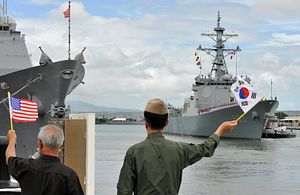A recent public opinion report by the Asan Institute for Policy Studies reinforces the view that South Korean society is becoming increasingly pragmatic.
The report, “Measuring a Giant: South Korean Perceptions of the United States,” looks at multiple indicators of how South Koreans view the U.S.: the favorability of ROK-U.S. relations, the U.S. national image, the U.S. in historical perspective, and the United States’ current political and economic influence vis-à-vis China, among many others.
The data indicates that South Koreans maintain a favorable view of the United States, despite deepening economic ties with a “rising” China. For those interested in South Korean nationalism “in a era of strength and prosperity,” the data also indicates a rising pragmatism in South Korea.
Indeed, since the ROK-U.S. alliance was somewhat de-securitized after the democratic transition (i.e., one may no longer be jailed for protesting the alliance), national identity and political attitudes began to take on a more pragmatic form. Katherine Moon carefully explains this transition — one may say transformation — in Korean Nationalism, Anti-Americanism, and Democratic Consolidation. Contrary to the anti-Americanism of the student movement of the 1980s, understood broadly as a struggle against an authoritarian governments and its U.S. ally, Moon finds the activism of the 1990s and 2000s is less about ideologically-driven “struggle” against the state and more about engaging in the democratic process, that is, putting pressure on democratically elected South Korean governments to renegotiate a more equal relationship with the United States. Within a new, democratic context, South Koreans can safely criticize the United States without fear of persecutions — legal or otherwise — by the state.
Combined with relative economic and political stability since the transition, national identity and political attitudes have taken on a pragmatic form. A rising pragmatism is shown most clearly by the data on the “U.S. in Historical Perspective” (p. 17 in the report). On questions related to the political, economic, security, and interest-based nature of the U.S.-ROK relationship, South Koreans showed a pragmatic view of things. For instance, 81.5 percent of respondents agree that the “U.S. made South Korea’s economic development possible,” but 61.4 percent agree the “U.S. was responsible for the Korean division.” About two-thirds do not believe that the “U.S. was an obstacle to Korean democratization.”
Notably, many do not believe “South Korea and the U.S. share the same interests.” The report’s authors underscore this point, writing: “When asked about shared interests, a surprising number (44.5 percent) stated that the two countries did not share the same interests.” They read, rightfully in the opinion of the author, that these “results indicate that South Koreans today have a pragmatic assessment of the relationship.”
Of course public opinion is volatile, quick to shift following some exogenous shock or significant internal development. But the social trends underscored in the report seem lasting. Indeed, in comparative perspective, one can see similar trends unfolding. In Taiwan for example (a case very similar to South Korea), an identical transformation is taking place. Generational analysis shows that, with regards to national identity and political attitudes, there is a “rising rationalism.” The same process seems to be unfolding in South Korea.

































